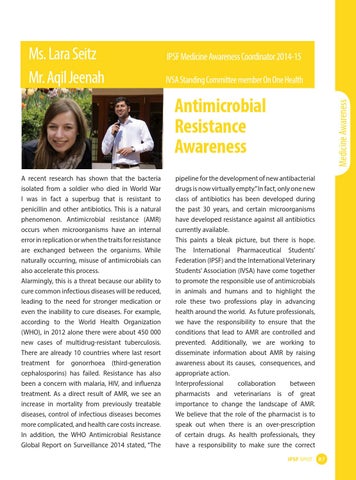Ms. Lara Seitz Mr. Aqil Jeenah
IPSF Medicine Awareness Coordinator 2014-15 IVSA Standing Committee member On One Health
A recent research has shown that the bacteria isolated from a soldier who died in World War I was in fact a superbug that is resistant to penicillin and other antibiotics. This is a natural phenomenon. Antimicrobial resistance (AMR) occurs when microorganisms have an internal error in replication or when the traits for resistance are exchanged between the organisms. While naturally occurring, misuse of antimicrobials can also accelerate this process. Alarmingly, this is a threat because our ability to cure common infectious diseases will be reduced, leading to the need for stronger medication or even the inability to cure diseases. For example, according to the World Health Organization (WHO), in 2012 alone there were about 450 000 new cases of multidrug-resistant tuberculosis. There are already 10 countries where last resort treatment for gonorrhoea (third-generation cephalosporins) has failed. Resistance has also been a concern with malaria, HIV, and influenza treatment. As a direct result of AMR, we see an increase in mortality from previously treatable diseases, control of infectious diseases becomes more complicated, and health care costs increase. In addition, the WHO Antimicrobial Resistance Global Report on Surveillance 2014 stated, “The
Medicine Awareness
Antimicrobial Resistance Awareness pipeline for the development of new antibacterial drugs is now virtually empty.” In fact, only one new class of antibiotics has been developed during the past 30 years, and certain microorganisms have developed resistance against all antibiotics currently available. This paints a bleak picture, but there is hope. The International Pharmaceutical Students’ Federation (IPSF) and the International Veterinary Students’ Association (IVSA) have come together to promote the responsible use of antimicrobials in animals and humans and to highlight the role these two professions play in advancing health around the world. As future professionals, we have the responsibility to ensure that the conditions that lead to AMR are controlled and prevented. Additionally, we are working to disseminate information about AMR by raising awareness about its causes, consequences, and appropriate action. Interprofessional collaboration between pharmacists and veterinarians is of great importance to change the landscape of AMR. We believe that the role of the pharmacist is to speak out when there is an over-prescription of certain drugs. As health professionals, they have a responsibility to make sure the correct IPSF SPOT
87
